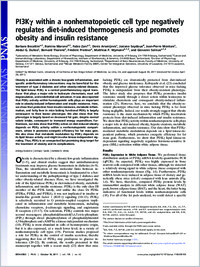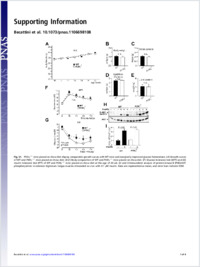PI3Kγ within a nonhematopoietic cell type negatively regulates diet-induced thermogenesis and promotes obesity and insulin resistance
- Becattini, Barbara Laboratory of Metabolic Stress Biology, Division of Physiology, Department of Medicine, University of Fribourg, Switzerland
- Marone, Romina Cancer and Immunobiology Laboratory, Department of Biomedicine, Institute of Biochemistry & Genetics, Basel, Switzerland
- Zani, Fabio Laboratory of Metabolic Stress Biology, Division of Physiology, Department of Medicine, University of Fribourg, Switzerland
- Arsenijevic, Denis Division of Physiology, Department of Medicine, University of Fribourg, Switzerland
- Seydoux, Josiane Department of Basic Neurosciences, Faculty of Medicine, University of Geneva, Switzerland
- Montani, Jean-Pierre Division of Physiology, Department of Medicine, University of Fribourg, Switzerland
- Dulloo, Abdul G. Division of Physiology, Department of Medicine, University of Fribourg, Switzerland
- Thorens, Bernard Mouse Metabolic Facility (MEF), Center for Integrative Genomics, University of Lausanne, Switzerland
- Preitner, Frédéric Mouse Metabolic Facility (MEF), Center for Integrative Genomics, University of Lausanne, Switzerland
- Wymann, Matthias P. Cancer and Immunobiology Laboratory, Department of Biomedicine, Institute of Biochemistry & Genetics, Basel, Switzerland
- Solinas, Giovanni Laboratory of Metabolic Stress Biology, Division of Physiology, Department of Medicine, University of Fribourg, Switzerland
-
26.09.2011
Published in:
- Proceedings of the National Academy of Sciences of the United States of America. - 2011, vol. 108, no. 42, p. E854-E863
English
Obesity is associated with a chronic low-grade inflammation, and specific antiinflammatory interventions may be beneficial for the treatment of type 2 diabetes and other obesity-related diseases. The lipid kinase PI3Kγ is a central proinflammatory signal transducer that plays a major role in leukocyte chemotaxis, mast cell degranulation, and endothelial cell activation. It was also reported that PI3Kγ activity within hematopoietic cells plays an important role in obesity-induced inflammation and insulin resistance. Here, we show that protection from insulin resistance, metabolic inflammation, and fatty liver in mice lacking functional PI3Kγ is largely consequent to their leaner phenotype. We also show that this phenotype is largely based on decreased fat gain, despite normal caloric intake, consequent to increased energy expenditure. Furthermore, our data show that PI3Kγ action on diet-induced obesity depends on PI3Kγ activity within a nonhematopoietic compartment, where it promotes energetic efficiency for fat mass gain. We also show that metabolic modulation by PI3Kγ depends on its lipid kinase activity and might involve kinase-independent signaling. Thus, PI3Kγ is an unexpected but promising drug target for the treatment of obesity and its complications.
- Faculty
- Faculté des sciences et de médecine
- Department
- Département de Médecine
- Language
-
- English
- Classification
- Biological sciences
- License
- License undefined
- Identifiers
-
- RERO DOC 28190
- DOI 10.1073/pnas.1106698108
- Persistent URL
- https://folia.unifr.ch/unifr/documents/302321
Other files
Statistics
Document views: 84
File downloads:
- sol_pnc.pdf: 131
- sol_pnc_sm.pdf: 74

